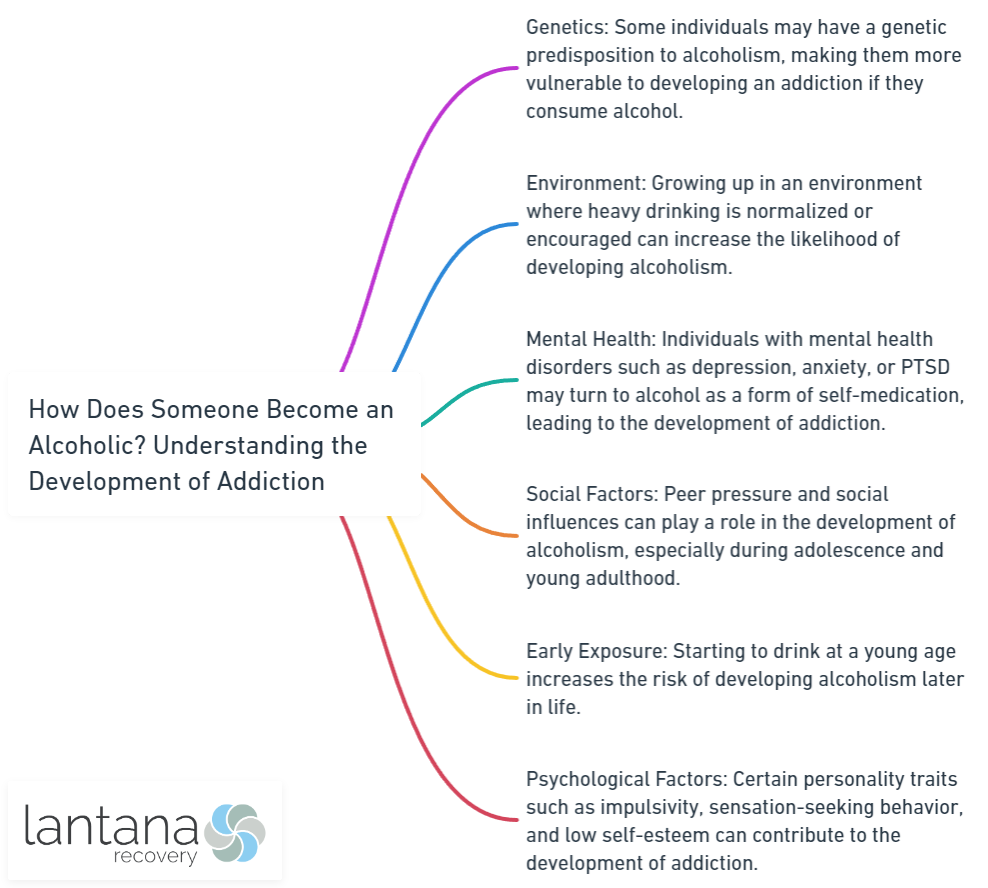Understanding the development of alcohol addiction is crucial in order to address and prevent this widespread problem. Alcohol addiction, also known as alcoholism, is a complex condition that occurs over time and involves various factors.
In this article, we will delve into the process of becoming an alcoholic, exploring the stages of addiction, the contributing factors, the signs and symptoms, and the consequences of alcohol addiction. We will also discuss the role of treatment and recovery, as well as prevention and intervention strategies.
Alcohol addiction is a progressive disease that can have severe physical, mental, and social implications. By understanding the factors and stages involved in the development of alcohol addiction, we can gain insight into effective prevention and treatment approaches. Let us delve deeper into the intricacies of alcohol addiction and explore how it takes hold of a person’s life.
What is Alcohol Addiction?
Alcohol addiction, also known as alcoholism or alcohol use disorder, is a chronic disease characterized by a strong craving for alcohol and an inability to control its consumption. It can have devastating effects on physical and mental health, relationships, and overall well-being.
Alcohol addiction is not solely determined by the amount of alcohol consumed but by its impact on a person’s life. It is associated with behaviors such as drinking in large quantities or for extended periods, unsuccessful efforts to cut down or control drinking, and spending significant time obtaining or recovering from alcohol’s effects.
Several factors influence the development of alcohol addiction, including genetic predisposition, environmental factors, and psychological issues. Some individuals may be more genetically susceptible, while others may be influenced by their social environment or underlying psychological problems.
Untreated alcohol addiction can result in severe health problems, including liver disease, cardiovascular issues, and mental health disorders. It can also negatively affect relationships, employment, and overall quality of life which you can see from the lives of alcoholics before and after its physical and emotional toll.
Recovery from alcohol addiction is possible with the right support and treatment. Seeking help from healthcare professionals at an institution like Lantana Recovery, attending support groups, and participating in therapy significantly increase the chances of overcoming addiction. It is important to remember that recovery is a lifelong journey, with the possibility of relapse, but with the right tools and support, individuals can lead fulfilling and alcohol-free lives.

Factors Contributing to Alcohol Addiction
Alcohol addiction is a complex issue influenced by various factors. In this section, we’ll uncover the contributors to alcohol addiction, including genetic predisposition, environmental influences, and psychological factors. By understanding these elements, we can gain insights into how addiction develops and the significant influences that shape an individual’s relationship with alcohol. So, let’s dive into the interplay of genetics, environment, and psychology to unravel the puzzle of alcohol addiction.
Genetic Predisposition
Genetic predisposition plays a significant role in alcohol addiction. Research shows that individuals with a family history of alcoholism are at a higher risk of developing this disorder. Genetics can influence a person’s susceptibility to alcohol addiction through the metabolism of alcohol, the effect of alcohol on the brain, and the overall response to alcohol. Certain variations in genes like ADH and ALDH can lead to faster breakdown of alcohol or increased sensitivity to its effects.
Having a genetic predisposition to alcohol addiction does not guarantee the development of the disorder. Environmental factors, psychological factors, and individual choices also play significant roles. However, individuals with a genetic predisposition should exercise caution with alcohol and may benefit from avoiding it altogether.
Understanding the genetic components of alcohol addiction can help in developing targeted prevention and intervention strategies. By identifying individuals at genetic risk, healthcare providers can offer early interventions and support to prevent the progression of alcohol addiction.
It’s important to remember that genetics may contribute to a person’s susceptibility to alcohol addiction, but it does not determine their destiny. With the right support, education, and resources, individuals with a genetic predisposition can make choices that reduce their risk and lead a healthy, alcohol-free life.
Environmental Factors
Environmental factors play a significant role in the development of alcohol addiction. These factors encompass various aspects of an individual’s surroundings and experiences that contribute to their vulnerability to alcohol dependency.
- Peer influence is one such factor that greatly impacts our behaviors and choices: If an individual regularly associates with heavy drinkers or those who have a positive attitude towards alcohol, they are more likely to develop an addiction themselves.
- Growing up in a family where alcohol use is prevalent or heavy drinking is normalized is another environmental factor that increases the risk of alcohol addiction: Being exposed to a household where alcohol misuse is common creates an environment that promotes drinking as a coping mechanism or way to socialize.
- Stressful circumstances also contribute to the development of alcohol addiction: Stressful life events such as financial difficulties, relationship problems, or work-related stress can lead individuals to turn to alcohol as an escape or self-medication. Chronic stressors can create a cycle of alcohol use as a coping mechanism, eventually leading to dependency.
- Availability and accessibility of alcohol is another crucial environmental factor: Easy access to alcohol through home environments or social settings where it is frequently consumed increases the likelihood of addiction. Environmental factors that make alcohol easily accessible remove barriers to excessive or problematic drinking.
- Cultural norms also play a role in an individual’s relationship with alcohol: Cultural attitudes toward alcohol consumption influence the risk of addiction. In some cultures, heavy drinking may be more socially acceptable or even encouraged, which further increases the risk of addiction.
Recognizing these environmental factors is crucial, and developing strategies to mitigate their influence is essential. Building a supportive social network, managing stress in healthy ways, and promoting awareness of cultural norms around alcohol can all contribute to preventing or addressing alcohol addiction. It’s important to remember that overcoming alcohol addiction requires professional help and support. If you or someone you know is struggling with alcohol addiction, seek treatment from qualified healthcare professionals or addiction specialists.
Psychological Factors
Psychological factors, such as emotional trauma, mental health disorders, stress and pressure, peer influence, and personality traits, play a major role in alcohol addiction. Individuals who experience abuse, neglect, or loss may turn to alcohol to cope with emotions, as it temporarily numbs pain and anxiety.
- Psychological factors like depression, anxiety, or bipolar disorder can contribute to alcohol addiction, as individuals with these disorders often self-medicate with alcohol, leading to substance abuse and worsened mental health.
- High levels of stress and pressure drive individuals to alcohol for relaxation and escape, but using alcohol as a coping mechanism can result in dependency and addiction.
- Peer pressure and social factors also significantly affect alcohol addiction, as people may drink excessively to fit in or meet social expectations, which can contribute to addiction over time.
- Certain personality traits, such as impulsivity or low self-esteem, increase susceptibility to alcohol addiction, as these factors influence alcohol response and addiction risk.
Understanding and addressing these psychological factors is crucial for preventing and treating alcohol addiction. By addressing emotional trauma, providing mental health support, teaching healthy coping mechanisms, and promoting positive peer influences, individuals can reduce their risk of addiction and improve their overall well-being.

Stages of Alcohol Addiction
From experimenting with alcohol to the grip of addiction, the stages of alcohol addiction take individuals on a complex journey. In this section, we’ll traverse through the different phases, uncovering the highs and lows of each. From the initial stages of experimentation to the troubling patterns of regular use and the challenging road of dependency, we’ll shed light on the path that leads individuals toward the grip of addiction. Brace yourselves for a revealing exploration ahead.
Experimentation
The stage of experimentation is important in alcohol addiction. During this phase, individuals may use alcohol occasionally to explore its effects and socialize. Here is a table outlining the characteristics of experimentation:
| Stage: | Experimentation |
| Description: | Individuals try alcohol occasionally in social settings or out of curiosity. |
During experimentation, individuals may not show signs of addiction or problematic alcohol use. They may control their alcohol intake and not experience negative consequences. Experimentation does not always lead to addiction, as many individuals can stop or limit their alcohol use without problems. However, experimentation can increase the risk of developing problematic alcohol use or addiction. For some individuals, the pleasurable effects of alcohol can lead to more frequent and heavier drinking, eventually progressing to regular use.
Understanding the stage of experimentation provides insights into early behaviors and attitudes toward alcohol use, which can help identify and address potential risks. By promoting education and awareness, individuals can make informed decisions about their alcohol consumption and minimize the risk of addiction.
It is important to recognize the potential impact of experimentation and take proactive measures to prevent escalation into problematic alcohol use or addiction.
Regular Use
Regular use is a pivotal stage in the development of alcohol addiction. Throughout this phase, individuals consistently consume alcohol, often for the purpose of relaxation or stress relief. It is important to recognize that regular use does not automatically indicate addiction, as many individuals can consume alcohol in moderation without experiencing any negative consequences.
However, regular use of alcohol does heighten the risk of addiction. The frequency and quantity of alcohol consumed during this stage can gradually escalate, resulting in a higher tolerance and the need for larger amounts in order to achieve the desired effects like the feeling of euphoria after drinking. Furthermore, regular use can lead to dependence, as the body becomes accustomed to alcohol and undergoes withdrawal symptoms once consumption is halted.
To prevent regular use from progressing into an addiction, it is essential to be mindful of the signs and symptoms of alcohol addiction and to seek assistance when necessary. These signs may involve a loss of control over alcohol intake, neglecting responsibilities and relationships, as well as experiencing cravings and withdrawal symptoms.
True Story: Sarah, a young professional, began incorporating alcohol into her regular routine as a means of relaxation after work. Initially, she enjoyed the occasional glass of wine or beer, but over time, her consumption increased. Sarah developed a reliance on alcohol every evening to unwind and cope with stress. She gradually consumed more in order to achieve the same effects and encountered difficulties in reducing her intake.
Upon recognizing the potential dangers associated with her regular alcohol use, Sarah took the initiative to seek help from a support group and attend therapy sessions. With the professional support and guidance she received, she managed to regain control over her alcohol consumption and attain a healthier, more balanced lifestyle. Sarah’s story underscores the significance of addressing regular alcohol use before it escalates into severe addiction.
Problematic Use
Problematic use of alcohol is characterized by patterns of alcohol consumption that have negative consequences on a person’s life and well-being. It is important to recognize the signs of problematic use to effectively address the issue and prevent further harm.
- Excessive consumption: Problematic use often involves drinking large quantities of alcohol in a short time. This can impair judgment, cause blackouts, and increase the risk of accidents.
- Loss of control: Individuals with problematic use may struggle to control their alcohol intake. They may want to cut down or quit drinking but find it difficult to do so.
- Neglecting responsibilities: People with problematic use may neglect personal and professional responsibilities due to their drinking. This can result in poor performance at work or school, strained relationships, and financial difficulties.
- Physical and psychological health issues: Problematic use can harm physical and mental health. It can lead to liver damage, cardiovascular problems, depression, anxiety, and other mental disorders.
- Continued use despite negative consequences: Individuals with problematic use often keep drinking despite experiencing negative consequences, such as legal issues, relationship problems, or health concerns.
- Tolerance and withdrawal symptoms: Problematic use can lead to tolerance, requiring higher alcohol amounts to achieve desired effects. When trying to stop or reduce drinking, withdrawal symptoms like tremors, sweating, and anxiety may occur.
It is crucial to seek help and support if you or someone you know is experiencing problematic alcohol use. Treatment options, including therapy, support groups, and medical interventions, can help individuals regain control over their drinking and improve well-being.
Pro-tip: If you suspect that your alcohol consumption is becoming problematic, reach out to a healthcare professional or support group for guidance and assistance. Remember, it is never too early or too late to seek help and make positive changes in your life.
Dependency and Addiction
Dependency and addiction are critical stages in alcohol addiction. Individuals become more reliant on alcohol and experience negative consequences.
1. Dependency occurs when a person becomes physically and psychologically reliant on alcohol: Their body has adapted to alcohol and requires it to function. Without alcohol, they may experience withdrawal symptoms such as sweating, shaking, and anxiety.
2. Addiction goes beyond physical dependency and involves a compulsive need to consume alcohol despite negative consequences: Individuals who are addicted to alcohol may prioritize drinking over responsibilities and relationships. They may also crave alcohol intensely and have difficulty controlling their consumption.
3. Dependency and addiction can lead to adverse effects on physical and mental health: Excessive alcohol consumption can damage the liver, heart, and brain, leading to conditions such as liver cirrhosis and cognitive impairment. It can also contribute to mental health disorders like depression and anxiety.
4. Treatment is crucial for individuals struggling with alcohol dependency and addiction: This may involve detoxification to manage withdrawal symptoms, counseling to address underlying issues, and support groups to promote long-term recovery.
5. Prevention and intervention strategies are essential to address alcohol dependency and addiction: These include education programs to raise awareness about the risks of excessive alcohol consumption, early intervention for at-risk individuals, and access to support services for those seeking help.

Signs and Symptoms of Alcohol Addiction
Recognizing signs and symptoms of alcohol addiction is crucial in identifying if someone is struggling with alcoholism. Key indicators include increased tolerance, withdrawal symptoms, loss of control, neglecting responsibilities, continued use despite negative consequences, withdrawal from social activities, drinking as a coping mechanism, increased focus on obtaining alcohol and experiencing cravings. These signs and symptoms are common in individuals with alcohol addiction and it is important to encourage them to seek help and begin their journey towards recovery.

Consequences of Alcohol Addiction
Alcohol addiction can have far-reaching consequences that impact various aspects of an individual’s life. In this section, we will explore the aftermath of alcohol addiction, touching upon physical health issues, and mental and emotional health problems, as well as the strain it puts on relationships and social connections. Brace yourself for a closer look at the sobering effects that alcohol addiction can have on individuals and the people around them.
Physical Health Issues
Alcohol addiction severely affects physical health, causing a variety of physical health issues. Understanding these associated problems is vital for effective treatment.
1. Liver damage: When individuals consume excessive amounts of alcohol, it can result in diseases like fatty liver, alcoholic hepatitis, and cirrhosis. These conditions impair the liver’s function, leading to various complications.
2. Cardiovascular problems: It increases the risk of cardiovascular diseases such as high blood pressure, heart failure, and an increased likelihood of having a stroke.
3. Weakens the immune system: This leaves individuals more vulnerable to infections and illnesses. This weakened immune system leads to frequent illnesses and delayed recovery.
4. Nutritional deficiencies: It negatively impacts nutrition and causes deficiencies in essential vitamins and minerals. Consequently, the body becomes weaker, and overall health is impaired.
5. Increased risk of certain cancers: Liver, breast, esophageal, and throat cancer are some cancers commonly linked to alcohol consumption.
6. Gastrointestinal problems: The inflammation of the stomach lining is a common consequence, resulting in conditions such as gastritis, ulcers, and gastrointestinal bleeding.
7. Damages the nervous system: It harms the nerves, leading to conditions like peripheral neuropathy and cognitive impairments.
Therefore, it is crucial to seek medical help and support to address these physical health issues associated with alcohol addiction. Treatment and incorporating lifestyle changes can significantly improve physical well-being and reduce the risk of complications.
Mental and Emotional Health Problems
Mental and emotional health problems can arise as a result of alcohol addiction. This addiction has a significant impact on the brain, leading to various psychological issues that can greatly affect overall well-being. “Traumatic events can lead to symptoms of anxiety, irritability, and depression in individuals. People may use alcohol as a way to relieve these post-traumatic symptoms” (Trauma in the Development of PTSD and Alcohol Addiction, Volpicelli et al., 1999.)
- Depression: It can lead to feelings of sadness, hopelessness, and a lack of interest in activities. These symptoms can escalate into clinical depression, a serious mental health condition that necessitates professional treatment.
- Anxiety disorders: Individuals may experience heightened unease, nervousness, and even panic attacks.
- Mood swings: These mood swings can range from extreme irritability and anger to periods of deep sadness and emotional instability.
- Memory problems, difficulties with concentration, and impaired decision-making abilities: These cognitive impairments significantly impact daily functioning and overall quality of life.
- Disrupts normal sleep patterns, resulting in insomnia, fragmented sleep, and poor sleep quality: The lack of sleep can worsen mental health problems and contribute to increased stress and fatigue.
- An increased risk of suicidal thoughts and completed suicides: Alcohol intensifies feelings of despair and hopelessness, highlighting the importance of addressing mental health concerns alongside addiction treatment.
To address mental and emotional health problems related to alcohol addiction, it is imperative to seek professional help. Treatment programs that offer comprehensive care, including therapy and support groups, have been shown to significantly improve a person’s chances of recovery.
I personally know someone who battled alcohol addiction for many years. They experienced severe depression, feeling hopeless and detached. They also developed anxiety disorders, experiencing frequent panic attacks and overwhelming unease. Extreme mood swings ranging from irritability to deep sadness were also common. Alcohol abuse had a detrimental impact on their cognitive abilities, leading to memory problems and difficulties with decision-making. Sleep became a challenge, with insomnia and fragmented sleep patterns.
Thankfully, they sought help and received treatment for both their alcohol addiction and mental health problems. Through therapy, support, and unwavering commitment, they were able to overcome their addiction and gradually improve their mental and emotional well-being. Today, they lead a fulfilling life, free from the grip of alcohol and the mental health challenges it brings.
Relationship and Social Issues
Alcohol addiction significantly impacts relationships and social interactions, making it vital to address these relationship and social issues. Recognizing the social issues that arise from alcohol addiction is crucial.
1. Strained Relationships: Alcohol addiction creates strain in relationships with family members, friends, and partners. Excessive alcohol use leads to conflicts, arguments, and misunderstandings, causing breakdowns in communication and trust.
2. Isolation and Loneliness: Individuals struggling with alcohol addiction often isolate themselves from social activities and events. They prioritize drinking over spending time with loved ones, resulting in loneliness and loss of support from social networks.
3. Financial Problems: Alcohol addiction can lead to financial issues as individuals allocate a significant portion of their income to alcohol. This causes financial strain, debt, and difficulties meeting basic needs, which in turn impacts relationships and social well-being.
4. Legal Consequences: Alcohol addiction contributes to legal issues such as DUI charges or public intoxication, causing strain in relationships, damaging reputations, and creating social stigma.
5. Social Stigma: Society stigmatizes individuals with alcohol addiction, creating barriers to forming and maintaining relationships. Stigma leads to social exclusion, discrimination, and a lack of understanding and support from others.
6. Impact on Parenting: Alcohol addiction has a negative impact on parenting abilities, resulting in neglect, inconsistency, and emotional instability. This harms the well-being of children and family relationships.
Addressing these relationship and social issues is crucial when dealing with alcohol addiction. Seeking professional help, engaging in therapy, and rebuilding relationships contribute to positive changes and a healthier social life.

The Role of Treatment and Recovery
Treatment and recovery play a crucial role in overcoming alcohol addiction and achieving long-term sobriety. When considering treatment, it is important to explore various options such as inpatient rehab, outpatient programs, counseling, and support groups like Alcoholics Anonymous (AA). Individual needs and circumstances should be taken into account when selecting the appropriate treatment.
- For individuals with severe alcohol dependence, medical detoxification may be necessary to safely manage withdrawal symptoms. Close medical monitoring ensures a smooth transition and minimizes complications.
- Therapy and counseling are essential for providing support during the recovery process. Approaches such as cognitive-behavioral therapy (CBT), motivational interviewing, and family therapy address the underlying causes and triggers of addiction.
- Medications can also play a role in recovery by reducing cravings, managing withdrawal symptoms, and preventing relapse. It is important for healthcare professionals to prescribe and monitor these medications for safe and effective use.
- Building a strong support network is crucial for long-term recovery. Participation in support groups like AA or seeking counseling from addiction specialists provides understanding, encouragement, and guidance.
True Story: John, a 40-year-old man, battled with alcohol addiction for over a decade. After realizing the negative impact on his relationships and career, he decided to seek help. John enrolled in an outpatient rehab program that included therapy sessions, group counseling, and regular check-ins with his healthcare provider.
Through his dedication to treatment and the support of his peers and loved ones, John successfully completed the program and continued attending AA meetings. Over time, he experienced a decrease in cravings and regained control over his life. Today, John celebrates four years of sobriety, having rebuilt his relationships and career.
John’s story emphasizes the pivotal role of treatment and recovery in turning one’s life around and achieving lasting sobriety. With the right support and resources, anyone struggling with alcohol addiction can find their path to recovery and a brighter future.
Prevention and Intervention Strategies
Prevention and intervention strategies are crucial for addressing alcohol addiction and ensuring individuals’ well-being. Here are some effective approaches to preventing and intervening in alcohol addiction:
- Education: Raising awareness about the risks and consequences of alcohol abuse is essential. Providing accurate information about the short-term and long-term effects of alcohol can help individuals make informed decisions.
- Early Intervention: Identifying signs of alcohol abuse at an early stage can prevent its progression into addiction. Recognizing behaviors such as increased tolerance, withdrawal symptoms, and neglecting responsibilities can prompt intervention.
- Supportive Environment: Creating a supportive environment that promotes healthy coping mechanisms can reduce the risk of alcohol addiction. Encouraging open communication, emphasizing emotional well-being, and providing opportunities for social engagement can be beneficial.
- Screening and Brief Interventions: Implementing routine screenings for alcohol use in healthcare settings allows for early detection and intervention. Brief interventions, such as motivational interviewing, can help individuals reflect on their alcohol use and make positive changes.
- Treatment Programs: Accessible and effective treatment programs for individuals struggling with alcohol addiction are essential. These programs can include counseling from Lantana Recovery specialists, support groups, and medical interventions tailored to meet individual needs.
Prevention and intervention strategies play a crucial role in addressing this issue.
Frequently Asked Questions
How does someone become an alcoholic?
Alcoholism is a complex condition caused by a combination of genetic, environmental, and psychological factors. Stressful life events, mental health disorders, peer pressure, easy access to alcohol, and the normalization of heavy drinking can contribute to the development of alcoholism. Trauma, mental illness, genetics, and environmental factors all increase the risk of developing alcohol use disorder.
What are the risk factors for developing alcohol use disorder (AUD)?
Several factors increase the risk of developing AUD. These include drinking at an early age, with those who start drinking before age 15 being more likely to develop AUD. Genetics and family history of alcohol problems also play a role. Mental health conditions and a history of trauma, such as depression, post-traumatic stress disorder, and attention deficit hyperactivity disorder, are comorbid with AUD and increase the risk of developing the disorder.
Are there any physical or psychological effects of alcohol abuse?
Yes, alcohol abuse can lead to a variety of physical and psychological effects. Physically, excessive alcohol use can cause health issues such as memory loss, stomach ailments, heart problems, cancer, brain damage, and liver cirrhosis. Mentally, alcohol abuse can worsen existing mental health conditions and lead to family violence and abuse. It can also contribute to the development of new psychological problems, such as panic disorders.
How can someone with an alcohol use disorder (AUD) seek help?
If someone suspects they have AUD, it is crucial to seek help from appropriate sources. Some individuals can recover on their own with the support of family and friends, but those with alcohol dependence often need outside help. Consulting with a trusted psychologist or health professional can provide guidance and support in addressing AUD. They can offer various treatment options, including behavioral therapies, medications, and referrals to self-help groups.
What are the treatment options for alcohol use disorder (AUD)?
Treatment options for AUD include medications and behavioral therapies. Three medications approved by the U.S. Food and Drug Administration can help individuals reduce or stop drinking. Behavioral treatments, such as cognitive-behavioral coping skills treatment and motivational enhancement therapy, aim to change drinking behavior. Mutual support groups, such as Alcoholics Anonymous, can also provide additional support and guidance in combination with medications and behavioral therapies.
Is recovery from alcohol use disorder (AUD) possible?
Yes, recovery from AUD is possible, although setbacks are common. Seeking professional help, engaging in evidence-based treatments, and having a strong support system can greatly increase the chances of successful long-term recovery. It is important to remember that recovery is a lifelong process and individuals with AUD may be vulnerable to relapse. However, with the right support and treatment, individuals can achieve and maintain a healthy and fulfilling life without alcohol.










